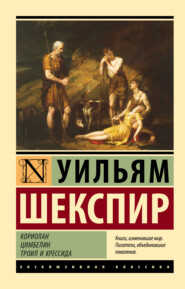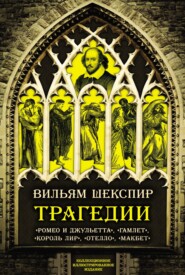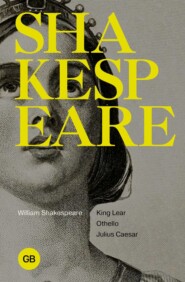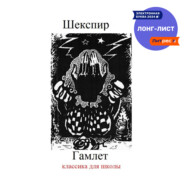По всем вопросам обращайтесь на: info@litportal.ru
(©) 2003-2025.
✖
Twelfth Night; or, What You Will
Настройки чтения
Размер шрифта
Высота строк
Поля
Mal. Here, madam, at your service.
Oli. Run after that same peevish messenger,
Orsino's man: he left this ring behind him,
Would I, or not; tell him, I'll none of it.
Desire him not to flatter with his lord,
Nor hold him up with hopes; I am not for him:
If that the youth will come this way to-morrow,
I'll give him reasons for't. Hie thee, Malvolio.
Mal. Madam, I will.
[Exit Malvolio.
Oli. I do I know not what; and fear to find
Mine eye too great a flatterer for my mind.
Fate, show thy force: Ourselves we do not owe;
What is decreed, must be; and be this so!
[Exit.
SCENE VI
A Street before Olivia's House.
Enter Viola, and Malvolio following.
Mal. Sir, sir, – young gentleman: Were not you even now with the Countess Olivia?
Vio. Even now, sir.
Mal. She returns this ring to you, sir; you might have saved me my pains, to have taken it away yourself. She adds moreover, that you should put your lord into a desperate assurance she will none of him: And one thing more; that you be never so hardy to come again in his affairs, unless it be to report your lord's taking of this. Receive it so.
Vio. She took the ring of me! – I'll none of it.
Mal. Come, sir, you peevishly threw it to her; and her will is, it should be so returned. – [Throws thering on the ground.] If it be worth stooping for, there it lies in your eye; if not, be it his that finds it.
[Exit Malvolio.
Vio. [Takes up the ring.] I left no ring with her: What means this lady?
Fortune forbid, my outside have not charm'd her!
She made good view of me; indeed, so much,
That, sure, methought, her eyes had lost her tongue,
For she did speak in starts distractedly.
She loves me, sure; the cunning of her passion
Invites me in this churlish messenger.
None of my lord's ring! – Why, he sent her none.
I am the man; – If it be so, (as 'tis,)
Poor lady! She were better love a dream.
What will become of this? As I am man,
My state is desperate for my master's love;
As I am woman, – now alas the day! —
What thriftless sighs shall poor Olivia breathe!
O time, thou must entangle this, not I;
It is too hard a knot for me to untie.
[Exit.
ACT THE SECOND
SCENE I
A Sea-port.
Enter Sebastian and Antonio.
Ant. Will you stay no longer? Nor will you not, that I go with you?
Seb. By your patience, no: my stars shine darkly over me; the malignancy of my fate might, perhaps, distemper yours; therefore I shall crave of you your leave, that I may bear my evils alone: It were a bad recompense for your love, to lay any of them on you.
Ant. Pardon me, sir, your bad entertainment.
Seb. O, good Antonio, pardon me your trouble.
Ant. Let me yet know of you, whither you are bound.
Seb. No, 'sooth, sir; my determinate voyage is mere extravagancy. – But I perceive in you so excellent a touch of modesty, that you will not extort from me what I am willing to keep in; therefore it charges me in manners the rather to express myself. – You must know of me then, Antonio, my name is Sebastian, which I called Rodorigo; my father was that Sebastian of Messaline, whom I know you have heard of: He left behind him, myself, and a sister, both born in an hour. If the heavens had been pleased, 'would we had so ended! But you, sir, altered that; for, some hour before you took me from the breach of the sea, was my sister drowned.
Ant. Alas, the day!
Seb. A lady, sir, though it was said she much resembled me, was yet of many accounted beautiful: but, though I could not overfar believe that, yet thus far I will boldly publish her, she bore a mind that envy could not but call fair. [He weeps.]
Ant. If you will not murder me for my love, let me be your servant.
Seb. If you will not undo what you have done, that is, kill him whom you have recovered, desire it not. Fare ye well at once: my bosom is full of kindness; and I am yet so near the manners of my mother, that, upon the least occasion more, mine eyes will tell tales of me. I am bound to the Duke Orsino's court, farewell.
Ant. The gentleness of all the gods go with thee!
Seb. Fare ye well.
[Exeunt.
SCENE II
A Dining-room in Olivia's House.
Sir Toby and Sir Andrew discovered, drinking and smoking.
Sir To. Come, Sir Andrew: not to be a-bed after midnight, is to be up betimes; and diluculo surgere, thou know'st, —
Oli. Run after that same peevish messenger,
Orsino's man: he left this ring behind him,
Would I, or not; tell him, I'll none of it.
Desire him not to flatter with his lord,
Nor hold him up with hopes; I am not for him:
If that the youth will come this way to-morrow,
I'll give him reasons for't. Hie thee, Malvolio.
Mal. Madam, I will.
[Exit Malvolio.
Oli. I do I know not what; and fear to find
Mine eye too great a flatterer for my mind.
Fate, show thy force: Ourselves we do not owe;
What is decreed, must be; and be this so!
[Exit.
SCENE VI
A Street before Olivia's House.
Enter Viola, and Malvolio following.
Mal. Sir, sir, – young gentleman: Were not you even now with the Countess Olivia?
Vio. Even now, sir.
Mal. She returns this ring to you, sir; you might have saved me my pains, to have taken it away yourself. She adds moreover, that you should put your lord into a desperate assurance she will none of him: And one thing more; that you be never so hardy to come again in his affairs, unless it be to report your lord's taking of this. Receive it so.
Vio. She took the ring of me! – I'll none of it.
Mal. Come, sir, you peevishly threw it to her; and her will is, it should be so returned. – [Throws thering on the ground.] If it be worth stooping for, there it lies in your eye; if not, be it his that finds it.
[Exit Malvolio.
Vio. [Takes up the ring.] I left no ring with her: What means this lady?
Fortune forbid, my outside have not charm'd her!
She made good view of me; indeed, so much,
That, sure, methought, her eyes had lost her tongue,
For she did speak in starts distractedly.
She loves me, sure; the cunning of her passion
Invites me in this churlish messenger.
None of my lord's ring! – Why, he sent her none.
I am the man; – If it be so, (as 'tis,)
Poor lady! She were better love a dream.
What will become of this? As I am man,
My state is desperate for my master's love;
As I am woman, – now alas the day! —
What thriftless sighs shall poor Olivia breathe!
O time, thou must entangle this, not I;
It is too hard a knot for me to untie.
[Exit.
ACT THE SECOND
SCENE I
A Sea-port.
Enter Sebastian and Antonio.
Ant. Will you stay no longer? Nor will you not, that I go with you?
Seb. By your patience, no: my stars shine darkly over me; the malignancy of my fate might, perhaps, distemper yours; therefore I shall crave of you your leave, that I may bear my evils alone: It were a bad recompense for your love, to lay any of them on you.
Ant. Pardon me, sir, your bad entertainment.
Seb. O, good Antonio, pardon me your trouble.
Ant. Let me yet know of you, whither you are bound.
Seb. No, 'sooth, sir; my determinate voyage is mere extravagancy. – But I perceive in you so excellent a touch of modesty, that you will not extort from me what I am willing to keep in; therefore it charges me in manners the rather to express myself. – You must know of me then, Antonio, my name is Sebastian, which I called Rodorigo; my father was that Sebastian of Messaline, whom I know you have heard of: He left behind him, myself, and a sister, both born in an hour. If the heavens had been pleased, 'would we had so ended! But you, sir, altered that; for, some hour before you took me from the breach of the sea, was my sister drowned.
Ant. Alas, the day!
Seb. A lady, sir, though it was said she much resembled me, was yet of many accounted beautiful: but, though I could not overfar believe that, yet thus far I will boldly publish her, she bore a mind that envy could not but call fair. [He weeps.]
Ant. If you will not murder me for my love, let me be your servant.
Seb. If you will not undo what you have done, that is, kill him whom you have recovered, desire it not. Fare ye well at once: my bosom is full of kindness; and I am yet so near the manners of my mother, that, upon the least occasion more, mine eyes will tell tales of me. I am bound to the Duke Orsino's court, farewell.
Ant. The gentleness of all the gods go with thee!
Seb. Fare ye well.
[Exeunt.
SCENE II
A Dining-room in Olivia's House.
Sir Toby and Sir Andrew discovered, drinking and smoking.
Sir To. Come, Sir Andrew: not to be a-bed after midnight, is to be up betimes; and diluculo surgere, thou know'st, —

















